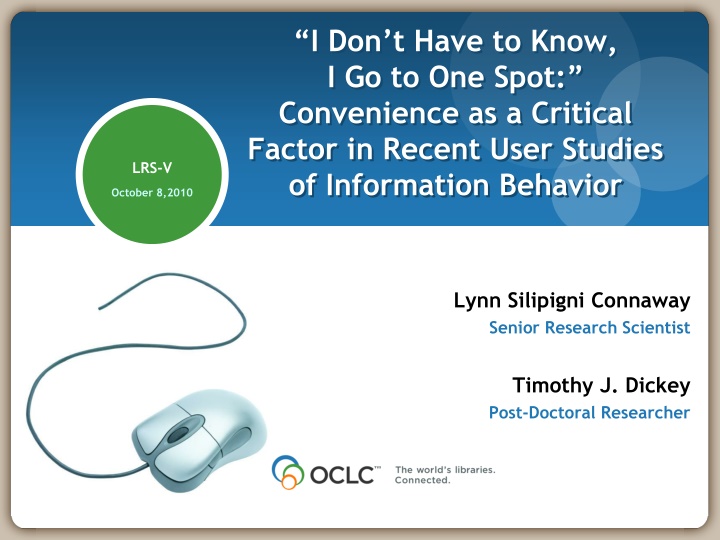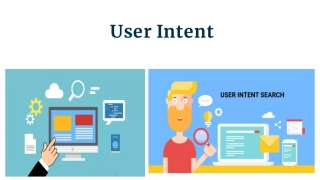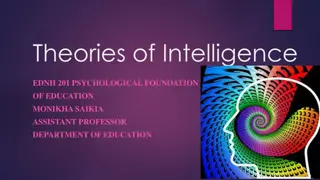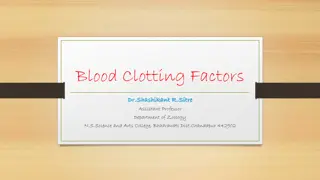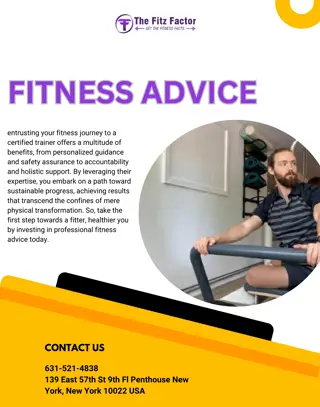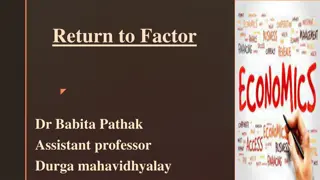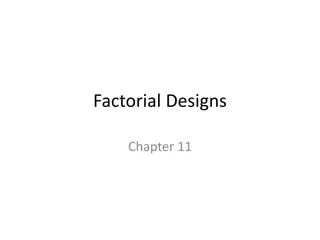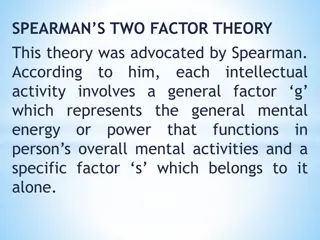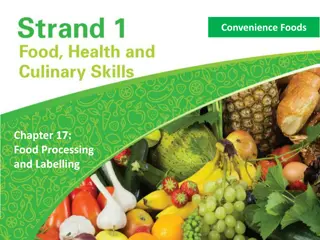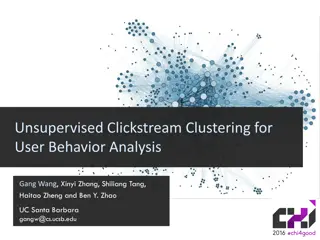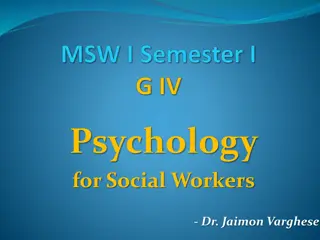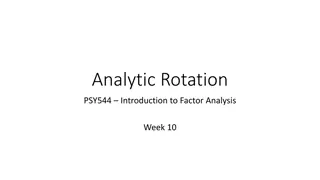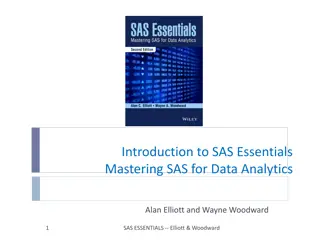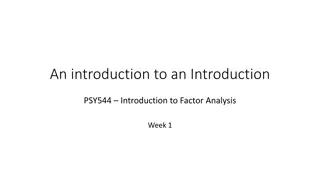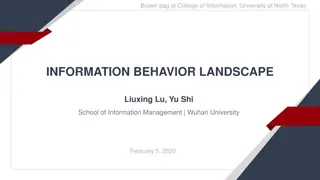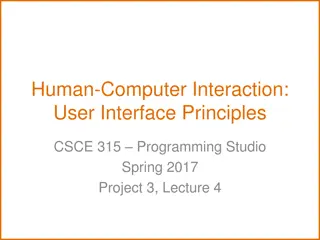Convenience as a Critical Factor in User Studies of Information Behavior
This content discusses the importance of convenience in recent user studies of information behavior, exploring how it impacts perceptions of libraries, information resources, and user behaviors. Theoretical frameworks, such as Rational Choice Theory and Gratification Theory, are examined, alongside data on user preferences for speed and convenience in resource choices. Insights from studies by OCLC, RIN, and JISC shed light on the value of convenience in accessing information and the evolving behaviors of researchers and information seekers.
Download Presentation

Please find below an Image/Link to download the presentation.
The content on the website is provided AS IS for your information and personal use only. It may not be sold, licensed, or shared on other websites without obtaining consent from the author.If you encounter any issues during the download, it is possible that the publisher has removed the file from their server.
You are allowed to download the files provided on this website for personal or commercial use, subject to the condition that they are used lawfully. All files are the property of their respective owners.
The content on the website is provided AS IS for your information and personal use only. It may not be sold, licensed, or shared on other websites without obtaining consent from the author.
E N D
Presentation Transcript
I Dont Have to Know, I Go to One Spot: Convenience as a Critical Factor in Recent User Studies of Information Behavior LRS-V October 8,2010 Lynn Silipigni Connaway Senior Research Scientist Timothy J. Dickey Post-Doctoral Researcher
Introduction JISC-funded meta-analysis The Digital Information Seeker: Report of Findings from Selected OCLC, RIN, and JISC User Behaviour Projects
Theoretical Framework for Convenience Rational Choice Theory Green, S.L. (2002). Rational choice theory. Satisficing behavior Prabha, et al. (2007). What is enough? Satisficing information needs. JDoc 63(1).
Theoretical Framework for Convenience Gratification Theory Chatman, E. (1991). Life in a small world: Application of gratification theory to information-seeking behavior. JASIS&T 42(6). Everyday-life Information Seeking Savolainen, R. (2008). Everyday information practices.
Convenience in the User Studies Data Perceptions of Libraries and Information Resources (OCLC, 2005) Search engines a lifestyle fit for speed & convenience Key criterion in resource choice is speed College Students Perceptions of Libraries and Information Resources (OCLC, 2006) Use the library less since they began using the Internet
Convenience in the User Studies Data Researchers and Discovery Services (RIN, 2006) Researchers value the convenience of desktop access Researchers Use of Academic Libraries (RIN, 2007) Convenience a major factor in behaviors Users expect not to spend much time in locating an item
Convenience in the User Studies Data Information Behavior of the Researcher of the Future (CIBER, 2008) Users demand 24/7 access, instant gratification JISC National E-books Observatory Project (JISC, 2009) Article downloads have nearly doubled Convenience a major factor in usage
Sense-making the Information Confluence: The Whys and Hows of College and University User Satisficing of Information Needs
Sense-making the Information Confluence Phrases used convenience convenient easy to access quick fast saved time time-saver
Sense-making the Information Confluence Undergraduates Google & Amazon Library systems Graduate students Google Library collections, ILL E-books Faculty Personal home or office library Google Colleague
Sense-making the Information Confluence: Academic and personal situations Survey Question # of convenience phrases 88 Situation in university life where you used electronic resources Situation specifically involving research Situation in life outside university where you used electronic resources Troublesome situation in university life 83 64 39 Troublesome situation in life outside university 11 TOTAL: 285
Sense-making the Information Confluence: Sources used Convenience phrases where source helped 52 44 12 6 5 4 5 2 2 Convenience phrases where source did not help 4 1 5 2 1 2 0 3 3 Information sources used (from a list provided in the survey) Convenience phrases Internet search engine Electronic databases College or university libraries Library catalogs Own observations Journal articles Students, classmates Public libraries Newspapers 56 48 17 8 6 6 5 5 5
Magic Wand: Ideal Information System Undergraduates Keyword searching in all books Universal library catalog Roving library staff Federated searching in databases Better hyperlinks Graduate students Better book/journal delivery systems Faculty Selective Dissemination of Information VRS
Seeking Synchronicity: Evaluating Virtual Reference Services from User, Non-user, and Librarian Perspectives
Seeking Synchronicity: VRS Users Very Important or Important Convenience 97% (n=133) of all respondents 98% (n=58) of frequent VRS users Immediate answers 89% (n=122) of all respondents 92% (n=54) of frequent VRS users
Convenience as factor in information seeking: VRS Users 100% 90% 80% All survey respondents (N=137) Frequent VRS users (N=59) 70% 86%, 51 85%, 116 60% 66%, 39 50% 55%, 76 40% The format that is most efficient is chat Convenient access to chat is excellent or very good
Factors important when choosing VRS: VRS Users I could not get to the library 73%, 100 78%, 46 I had a desperate need for quick answers 72%, 98 78%, 46 All survey respondents (N=137) Frequent VRS users (N=59) I needed reference help late at night or on the weekend 74%, 101 78%, 46 Chat reference is convenient 95%, 130 100%, 59 60% 70% 80% 90% 100%
Factors important when choosing VRS: VRS Users I had a desperate need for quick answers: VRS users Very important or important 100% 95% 90% 85% 80% 92%, 24 75% 66%, 58 70% 70%, 16 65% 60% 12-18 (N=26) 19-28 (N=23) 29+ (N=88)
Reasons for chat as first choice for information: VRS Users VRS users (N=76) 30% 25% 20% 29%, 22 15% 18%, 14 10% 4%, 3 12%, 9 7%, 5 9%, 7 7%, 5 5% 0%
Comparing specific aspects of FtF: VRS Non-Users Convenience of my access to FtF reference help is 45%, (n=83) Excellent or very good Don t choose chat reference because it may be unavailable when needed 60%, (n=110) Strongly agree or agree * VRS non-users (N=184)
Comparing specific features of other formats: VRS Non-Users VRS non-users (N=184) 100% 95% 90% 85% 80% 91%, 50 75% 84%, 116 70% 73%, 19 65% 60% Electronic formats are convenient Library is convenient Telephone is convenient
Convenience as factor in choosing information sources: VRS Non-Users VRS non-users (N=107) 35% 30% 25% 20% 30%, 32 15% 10% 5%, 5 15%, 16 4%, 4 12%, 13 3%, 3 5% 0% Start with Internet Start with Google Google Wikipedia Google Scholar Start with Wikipedia
Alternatives to the library and why: VRS Non-Users Why: Internet as starting point 2%, 2 Why: Inconvenience of the library 25%, 26 Why: Personal convenience 38%, 40 Online book sellers 1%, 1 Journals associated with Internet 1%, 1 Yahoo! 2%, 2 Expert web sites 3%, 3 Wikipedia 3%, 3 Google Scholar 3%,3 Databases associated with Internet 6%, 6 Google 11%, 12 Alternative source is the Internet 46%, 49 0% 10% 20% 30% 40% 50%
Possible reasons for trying chat: VRS Non-Users VRS non-users (N=107) Preferring chat to holding on the phone 1%, 1 Avoiding a long distance call 1%, 1 Experiencing bad weather 2%, 2 Citing general ease of use 2%, 2 Unable to telephone the library 4%, 4 Valuing using chat reference from home 4%, 4 Perceiving chat reference as faster 4%, 4 Using the service after hours 7%, 7 Unable to get to the library 7%, 7 Needing immediate answers 26%, 28 Convenience 61%, 65 -10% 0% 10% 20% 30% 40% 50% 60% 70%
Implications for Practice Make library experience more like the Web Google, Amazon.com, iTunes Provide more authoritative, reliable digital sources e-journals, data sets, VREs, open source materials, multimedia objects, blogs Advertise library brand better Develop economic model for resources
Implications for Research Investigate how and why people get information in different contexts and situations Theoretical research combining individual and social factors that influence information-seeking behaviors
Connaway, LS & Dickey, TJ. (2010). The Digital Information Seeker: Report of Findings from Selected OCLC, RIN, and JISC User Behaviour Projects. London: HECFCE. Perceptions of libraries and information resources (OCLC, December 2005). College students perceptions of libraries and information resources (OCLC, April 2006). Sense-making the information confluence: The whys and hows of college and university user satisficing of information needs (IMLS/Ohio State University/OCLC, July 2006). Researchers and discovery services: Behaviour, perceptions and needs (RIN, November 2006). Researchers use of academic libraries and their services (RIN/CURL, April 2007). Information behaviour of the researcher of the future (CIBER/UCL, commissioned by BL and JISC, January 2008). http://www.jisc.ac.uk/media/documents/publications/reports/2010/digitalinformationseekerreport.pdf
Connaway, LS & Dickey, TJ. (2010). The Digital Information Seeker: Report of Findings from Selected OCLC, RIN, and JISC User Behaviour Projects. London: HECFCE Seeking synchronicity: Evaluating virtual reference services from user, non-user and librarian perspectives (OCLC/ IMLS/ Rutgers, June 2008). Online catalogs: What users and librarians want (OCLC. March 2009). E-journals: Their use, value and impact (RIN, April 2009). JISC national e-books observatory project: Key findings and recommendations (JISC/UCL, November 2009). Students use of research content in teaching and learning (JISC, November 2009). User behaviour in resource discovery (JISC, November 2009). http://www.jisc.ac.uk/media/documents/publications/reports/2010/digitalinformationseekerreport.pdf
